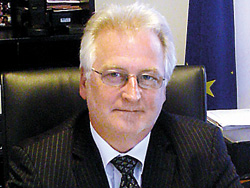Sri Lanka not seeking fresh GSP+ benefits:EU Rep

Bernard Savage
A new round of aid negotiations will get underway later this year or early next year between Sri Lanka and the European Union (EU), officials said. This follows the culmination of the 2007-2013 programme of grants (free money) to Sri Lanka worth Rs 58.2 billion (Euro 388 million). The next programme will run from 2013 to 2020.
“We don’t expect to see a decrease in aid. (On the other hand) I think it is unlikely that there will be an increase but that’s because of constraints in our budget (crisis),” Bernard Savage, Head of Delegation of the EU in Sri Lanka and the Maldives, adding “a new country strategy will also be prepared”.
Garments exports to the EU have fallen by 10-15 per cent this year in the months to May with a further drop envisaged in June, as the impact of the loss of GSP + concessions in mid-2010 slowly takes root. Exporters are urging the government to apply for a fresh round of concessions.
Asked about this, Mr Savage said, “… we have had no request from the government for a new facility.”
But he pointed out: “To use the words of the Minister of External Affairs (G.L. Peiris) this is a closed chapter (in our relationship). The fact is that GSP+ was withdrawn and there has been no further discussion on that issue and Sri Lanka has not re-applied. We need to move on.”
He said the normal GSP proagramme of concessions will continue as before. Rohan Abeykoon, Chairman of the Sri Lanka Apparel Exporters Association, said the loss of GSP + has not led to job losses but created an impact amongst small and medium scale exporters.
“It would be the loss of a critical mass where companies endemic to Sri Lanka and locally will lose while those with multinational connections will shift elsewhere and still survive,” he said, adding: “This is not a healthy trend”.
Easing exports to the EU coupled with lower consumer demand owing to the economic crisis there is a double-edged sword the industry is facing. He said in such a situation consumers may opt for the mid-or-low-end of the market range of products in which low-cost countries like Bangladesh and Cambodia, which both have GSP+, can further benefit. India is also on the verge of getting GSP +, a factor Sri Lanka needs to consider seriously, he said.
Mr Savage said the entire EU budget (for local and international use) has come under severe political pressure and in a sign of austerity, national governments are cutting their own costs.
He said the Mahinda Chinthana and other government priorities will be considered as the basis for the new 2013-2020 programme and development goals. There’ll be less post-conflict work in the areas affected by the conflict in the new plan of assistance. On specifics about the turbulent relations between the two sides, Mr Savage said that, with regard to trade there are no specific irritants. “I like to stress that in the normal run of affairs – whether we have political differences or not – doesn’t affect trade. GSP + was a specific case but if you look at the broad spectrum of trade relations, that (GSP+) was not affected by short-term considerations,” he added.
He said Sri Lanka’s GSP + application didn’t fulfill conditions on the Inter Convention on Civil and Political rights. “I must further stress that the conditions in the GSP + is not about European rules but international rules subscribed by the countries themselves. It’s not our rules. It’s simply that for countries to benefit from GSP+ they should apply laws they have already subscribed for.”
comments powered by Disqus
























